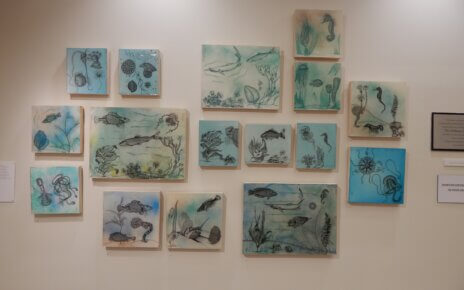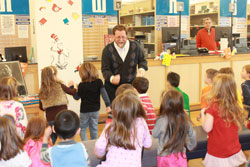The fifth Biennial Interdisciplinary Race Conference was held at the University from Nov. 9 – 11. With discussions led by numerous distinguished scholars from 15 U.S. states, four continents, and twelve nations, the conference focused on leadership and how it relates in terms of race and gender
Hosted by the Department of History and Anthropology, the Interdisciplinary Race Conference’s sub-theme was: Race, Gender, and Leadership in Global Societies: Goals, Strategies, and Reconciliation. Each of these subtopics were discussed at length over the three day conference period with presentations of scholarly works and open conversation.
The primary conference organizers were Hettie V. Williams, Ph.D., a lecturer in African American history, and Julius O. Adekunle, Ph.D., a professor of history and anthropology. Originating in 2008, the first race conference occurred the year that Barack Obama was elected president, and was conceived out of conversations between Williams and Adekunle. “My dissertation concerns African American women in the civil rights movement and I have written on the topic of race/taught courses of the subject for several years,” said Williams.
The first day of the conference was held in Wilson Auditorium. The conference opened with a performance of “Glory” by Deacon Solomon Cobbs of the Freehold Church of God. Cobbs was followed by a presentation from the keynote speaker, Jonathan Holloway, PhD., the Provost of Northwestern University and the former Dean of Yale College.
Holloway deliberated the topic “The Price of Recognition: Race and the Making of the Modern University.” Among the subtopics were how to include students of color in “historically white institutions.” Holloway elaborated on the idea, explaining the tension between the memory of history and its written record, all while deftly incorporating narratives and its written record, all while deftly incorporating narratives from Ralph Ellison’s The Invisible Man.
After his keynote address, an audience member asked his thoughts on keeping the University’s “Wilson” Hall, to which Holloway responded with an explanation of former President Woodrow Wilson’s significance at Princeton University. Holloway explained that he does not believe in renaming a building in vain.
“[I am] not for celebrating without knowing it was hard-earned,” Holloway said. He then went on to explain that many students at Yale did not understand Calhoun in his entirety—which left them confused as to why the University was making efforts to rename the building.
Holloway added that it was important to understand the impact of having named a building after such a figure in the first class. “It says a lot about what the University stood for in 1933,” he said.
Holloway inspired attendees, including Deanna Shoemaker, Ph.D., an associate professor of communication, who mentioned Holloway’s presentation to be one of the most thought provoking.
“In this politically explosive moment in history, being an institute of higher education, we should be the leaders in deciding what the 21st century stance on race and inclusivity is,” said Shoemaker. “It is important for us to step back and evaluate, what does our curriculum look like? What does our faculty look like? [At Monmouth,] our faculty members are predominately white.”
“It is important for our students to see faculty members of mixed races breaking through stereotypes and stigmas,” added Shoemaker.
Nicolas VanDaley, a graduate student of anthropology, was present each day of the conference and said “[Attending the conference is] not just about supporting the community, it’s about supporting humanity. This conference was amazing. One stand out speaker was Laila Muhammad, who is W.D Muhammad, a past leader of Islam’s, daughter. Conferences like this give a sort of ground work to how to combat urgent issues in today’s political times.”
The second day of the conference was held in Magill Commons. This day drew attention to race in relationship to leadership, politics, religion, culture, community, and media. Academic works published by Monmouth University faculty were reviewed, including including “Hispaniola Re-Envisioned: Haitian Dominican Relations in Contemporary Dominican Cultural Production” by Paul Humphrey, Ph.D., assistant professor of world culture and languages, and “Every Voter Had to Run the Gauntlet: The U.S. Army on Election Day in the Reconstruction South” by Christopher DeRosa, Ph.D., the director of the history program.
The final day primarily explored race in relation to literature, education, and science in Magill Commons. From 9 a.m. to 12 p.m., a series of lectures explored the evolution of historically marginalized groups and sexes and connected these observations with methods to properly educate students in today’s society.
“One of the most distinctive aspects of the race conference involves the many ways in which MU students participate in the proceedings—both in front of and behind the dais,” said Kenneth Womack, Ph.D., Dean of the School of Humanities and Social Sciences. “We owe this aspect to the leadership of the conference’s steering committee, which ensured that students, our most important audience, were involved in every aspect of the event, from planning through the delivery of the conference itself.”
Womack was involved in organizing the conference and retrieving various resources for its production. “With the race conference, the great benefit for Monmouth not only involves hosting this scholarly exercise, but looking for opportunities to share the knowledge that has been created on a number of fronts, both in terms of publication, but also in terms of the classroom, where the many MU professors and students who attended the event can continue to debate what they have learned and how it can be applied to our community,” he said.
Upon the conclusion of the conference, over 50 academics had taken part in roundtable discussions or presentations. Walter Greason, Ph.D., Dean of the Honor School and a race conference committee member, said, “The committee sustains a tradition of excellence that makes Monmouth University a world leader in discussions about race, leadership, diversity, and inclusion.”
Greason was asked by Adekunle and Williams to provide a pre-conference experience including three speakers on the day before the formal conference opening for this year’s conference. “The race conference has helped me produce groundbreaking new research on race, history, and economics over the last decade,” said Greason.
Greason continued, “year after year, dozens of scholars from the most prestigious institutions in the world come together at Monmouth University to explore some of the most difficult and important questions that face humanity.”


